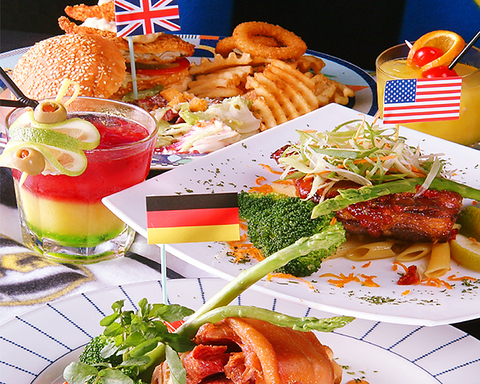Many bars around town, and especially those in five star hotels, have set up screens for the World Cup. The Front Page Bar at the Imperial Hotel (
Front Page's international style is that of an up-market British pub, and offers an elegant, cheerful and pleasant environment in which to sit and relax with friends or have a drink at the bar. The low ceiling gives it an intimate feel, and the selection of flags around the room hints at the inter-national crowd that passes through.
Although the Imperial Hotel has been around for the last 30 years, Front Page has been open for just two years.

PHOTO COURTESY OF FRONT PAGE BAR
The hotel's proximity to Taipei's Zhongshan Soccer Stadium makes it a favorite with visiting athletes, including local sports icon, Wang Chien-ming (王建民), who plays for the New York Yankees. The bar displays a baseball shirt with his autograph, among much other sporting paraphernalia.
Bar manager Liao Yu-hwei (廖裕輝), has done his bit for national sports; he was formerly on Taiwan's soft tennis team.
Head chef of the Front Page Bar Tony Chen (陳進男) said that a variety of international dishes are offered to appeal to guests from many different countries. Dutch deep-fried beef meatballs with tomato sauce (NT$480) is recommended, and was selected to represent the hotel at the Taipei International Food Show last week.
For avid sports fans who don't want to take their eyes off the television, Brazilian grilled beef skewers (NT$480) are popular as they are easy to handle. The French grilled ham and cheese sandwich (NT$360), provides a big meal, even if it tastes a bit ordinary for the price.
Other dishes include German pig knuckle (NT$480), Italian carbonara (NT$380), Mexican beef fried rice with hot chili (NT$360) and English deep-fried fish burger (NT$380).
Cocktails cost around NT$270 and the bar stocks a wide range of beers and spirits, starting at NT$220 per glass.
The bar has a private suite for three to eight people. There is no minimum charge for this, although a reservation is necessary. Internet access is a cinch with WiFi access.

One of the biggest sore spots in Taiwan’s historical friendship with the US came in 1979 when US president Jimmy Carter broke off formal diplomatic relations with Taiwan’s Republic of China (ROC) government so that the US could establish relations with the People’s Republic of China (PRC). Taiwan’s derecognition came purely at China’s insistence, and the US took the deal. Retired American diplomat John Tkacik, who for almost decade surrounding that schism, from 1974 to 1982, worked in embassies in Taipei and Beijing and at the Taiwan Desk in Washington DC, recently argued in the Taipei Times that “President Carter’s derecognition

This year will go down in the history books. Taiwan faces enormous turmoil and uncertainty in the coming months. Which political parties are in a good position to handle big changes? All of the main parties are beset with challenges. Taking stock, this column examined the Taiwan People’s Party (TPP) (“Huang Kuo-chang’s choking the life out of the TPP,” May 28, page 12), the Democratic Progressive Party (DPP) (“Challenges amid choppy waters for the DPP,” June 14, page 12) and the Chinese Nationalist Party (KMT) (“KMT struggles to seize opportunities as ‘interesting times’ loom,” June 20, page 11). Times like these can

Dr. Y. Tony Yang, Associate Dean of Health Policy and Population Science at George Washington University, argued last week in a piece for the Taipei Times about former president Ma Ying-jeou (馬英九) leading a student delegation to the People’s Republic of China (PRC) that, “The real question is not whether Ma’s visit helps or hurts Taiwan — it is why Taiwan lacks a sophisticated, multi-track approach to one of the most complex geopolitical relationships in the world” (“Ma’s Visit, DPP’s Blind Spot,” June 18, page 8). Yang contends that the Democratic Progressive Party (DPP) has a blind spot: “By treating any

You can tell a lot about a generation from the contents of their cool box: nowadays the barbecue ice bucket is likely to be filled with hard seltzers, non-alcoholic beers and fluorescent BuzzBallz — a particular favorite among Gen Z. Two decades ago, it was WKD, Bacardi Breezers and the odd Smirnoff Ice bobbing in a puddle of melted ice. And while nostalgia may have brought back some alcopops, the new wave of ready-to-drink (RTD) options look and taste noticeably different. It is not just the drinks that have changed, but drinking habits too, driven in part by more health-conscious consumers and